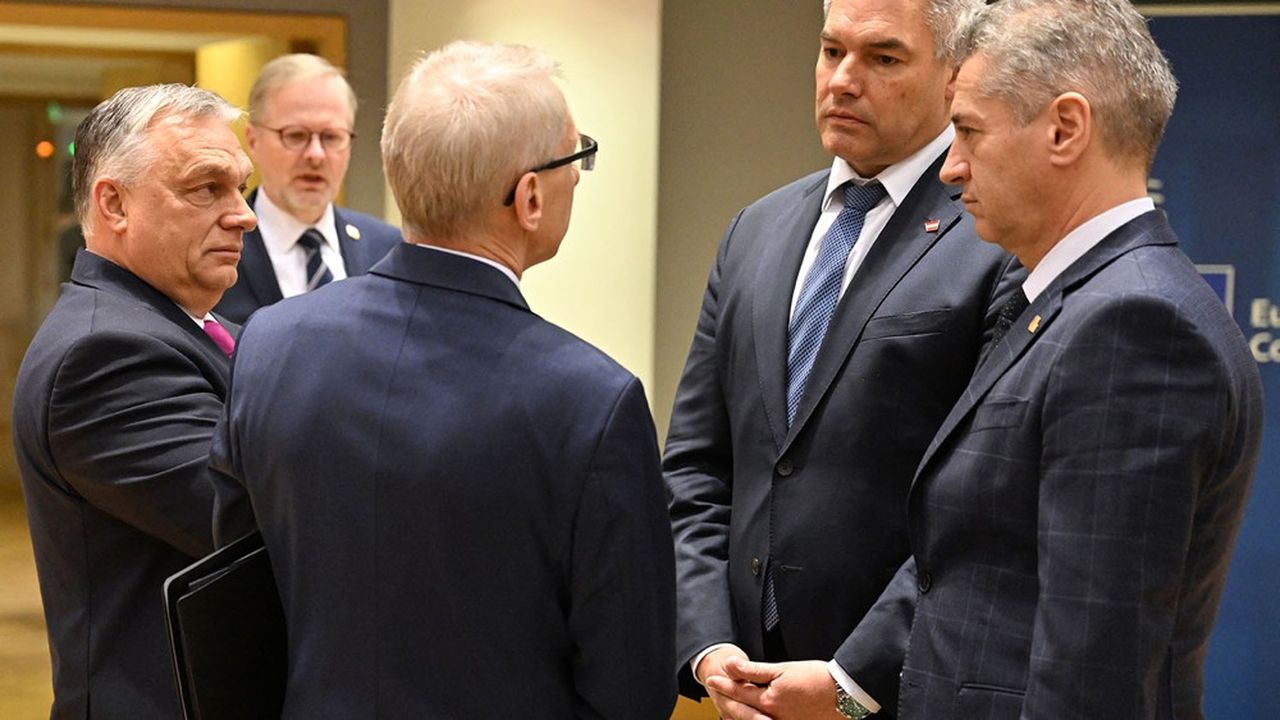Six weeks after their last meeting, the Twenty-Seven meet this Wednesday evening in Brussels to try, after an informal dinner, to finally agree on aid to Ukraine during the day of Thursday. In mid-December, the financial support package of 50 billion euros over four years proposed by the European Commission (17 billion in grants, 33 billion in loans) was blocked by the veto of Hungarian Prime Minister Viktor Orban.
Tuesday evening, the ambassadors of the Member States had not managed to obtain the green light from Budapest, which could possibly commit on an annual basis, with a new unanimous decision every twelve months. Viktor Orban seems to be betting on a notable surge of Eurosceptic forces in the European elections in June, and on a return of Donald Trump to the White House in November. Enough to perhaps break the unity of Europeans in their support for kyiv, according to Budapest. The Twenty-Six categorically refuse these requests, because they want to provide Kiev with visibility and planning capacity.
Degree of nervousness
The subject is becoming pressing, as Ukraine could encounter liquidity problems as early as March. At worst, if Thursday’s Summit ends with a new blockage, we could extend (by qualified majority) the financial assistance program decided in 2022, which allowed the payment to kyiv of 18 billion euros in 2023.
While “the degree of nervousness has increased sharply in recent weeks”, according to a diplomat, an alternative intergovernmental scenario, between the Twenty-Six countries other than Hungary, has circulated well. But the capitals want to avoid it. “This solution carries risks, both for the Union and Ukraine […] than for Hungary,” estimates the Elysée for example. It would also require validation by national parliaments, including the National Assembly in France. It would finally send a negative message to the rest of the world about the dissensions within the EU.
Blackmail
The tone of the conversation has deteriorated significantly in recent weeks. The Financial Times revealed on Monday a note from the European Council suggesting cutting European funds to Budapest to put Hungary in economic difficulty and push it into a corner.
Diplomats judged this “paper” unfortunate, in that it allows Viktor Orban to pose as a victim. “It’s a sort of blackmailer’s manual. […] I have no doubt about the authenticity of this document. Knowing Brussels, they are capable of it,” he declared to the weekly “Le Point”. The irony of the matter is that he has been accused of blackmailing the EU for months to obtain European funds frozen for undermining the rule of law.
New missions
On the military support front, the leaders planned to work on a reorientation of the European Peace Facility (EFF), an extra-budgetary instrument which was used to accelerate the transfer of stocks of military equipment to Ukraine from the States. members. It could be supplemented by an additional 5 billion euros, in a new logic of joint acquisition and production of arms.
The Twenty-Seven must at the same time agree on the revision of the Multiannual Financial Framework for 2024-2027 in order to finance new Union missions. An envelope of 9.6 billion euros was planned in December for the external dimension of migration and external relations linked to migration. More modest, a contribution of 1.5 billion should fund a new facility, STEP, to finance innovation projects and form, in the eyes of Paris, an embryonic European sovereignty fund.
Russian assets immobilized
Notable progress already seems to have been made: leaders are expected to endorse a Commission proposal to identify and sequester income from the Russian central bank’s assets immobilized in Europe (200 billion euros, 90% housed in the Belgian company). Euroclear). In a second stage, they could authorize their seizure and taxation for the benefit of Ukraine, once the possible financial consequences of this procedure have been clarified.
The agricultural issue, at a time when farmers are making their discontent heard in several member states, is not formally on the agenda but will be discussed during the informal dinner this Wednesday and on the sidelines of the summit itself.
2024-01-31 07:04:39
#Ukraine #Summit #TwentySeven #Hungarian #mortgage


